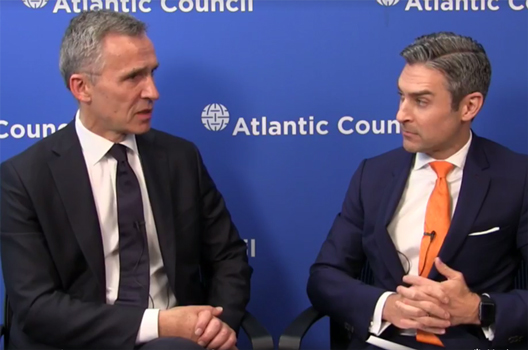 NATO Secretary General Jens Stoltenberg on June 5 affirmed the United States’ commitment to the Alliance’s collective defense provisions, a commitment US President Donald J. Trump publicly and controversially omitted making at a meeting with NATO leaders in Brussels in May.
NATO Secretary General Jens Stoltenberg on June 5 affirmed the United States’ commitment to the Alliance’s collective defense provisions, a commitment US President Donald J. Trump publicly and controversially omitted making at a meeting with NATO leaders in Brussels in May.
In a Facebook Live interview with Damon Wilson, executive vice president for programs and strategy at the Atlantic Council, Stoltenberg said that in his meetings with Trump, the US president had affirmed his “commitment to NATO.”
“There’s no way to be committed to NATO without being committed to Article 5,” Stoltenberg said, referring to the article of NATO’s founding treaty that deals with collective defense.
Although Trump’s unwillingness to publicly state support for the stipulation created much controversy, abiding by Article 5 is not a choice. “The obligation to protect each other, one for all and all for one, that’s a treaty obligation,” Stoltenberg pointed out.
“US commitment to NATO and Article 5 is not only in words, but in deeds,” he said. He described the United States’ demonstration of support for NATO, seen in the increase of troops, equipment, and funds intended to bolster European forces. “There can be no doubt that the US is committed to the defense of Europe because the US is increasing their military presence in Europe,” he said.
Later on June 5, in a speech at the Atlantic Council’s Distinguished Leadership Awards reception in Washington, US Vice President Mike Pence echoed Stoltenberg’s assertions, and unequivocally articulated what Trump would not: “Our commitment is unwavering… the United States is resolved, as we were at NATO’s founding and in every hour since, to live by the principle that an attack on one of us is an attack on all of us.” [Update: Trump on June 9 publicly committed the United States to Article 5.]
In light of the historically tense relationship between Europe and the United States over levels of defense spending, Stoltenberg asserted to European allies the necessity of burden sharing and investing in defense, especially as increasing instability has gripped the region following migrant flows from the Middle East, transnational and domestic terrorist threats, and renewed hostility from Russia. These threats have spurred a renewed effort by NATO members, evidenced by increased overall spending beginning in 2015 after years of decline.
For this reason, Montenegro’s accession to NATO membership on June 5, concurrent with the Distinguished Leadership Awards at which Montenegrin Prime Minister Duško Marković was present, is incredibly important for stabilizing the Balkans, according to Stoltenberg. It also displays that “if [Montenegro] want[s] to join… no one has the right the intervene in that process,” as Russia did when Ukraine considered attempting membership.
Both Stoltenberg and Pence provided reassurance for those skeptical of the United States’ commitment to NATO under Trump, with Pence affirming, “this is a threat we must face together; now is the time for NATO and this transatlantic alliance to stand united and stand strong… our alliance has faced far greater threats, but emerged stronger and more secure, united as allies.”
Kelly Russo is a communications intern at the Atlantic Council.
Image: (from left) NATO Secretary General Jens Stoltenberg joined the Damon Wilson, executive vice president of the Atlantic Council, for a Facebook Live discussion. (Atlantic Council)
